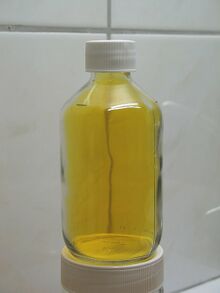أحادي كلوريد البروم

| |

| |

| |
| الأسماء | |
|---|---|
| أسماء أخرى
bromine(I) chloride
bromochloride bromine chloride | |
| المُعرِّفات | |
| رقم CAS | |
3D model (JSmol)
|
|
| ChemSpider | |
| ECHA InfoCard | 100.034.169 |
| رقم EC |
|
PubChem CID
|
|
| رقم RTECS |
|
| UNII | |
| UN number | 2901 |
CompTox Dashboard (EPA)
|
|
| |
| |
| الخصائص | |
| الصيغة الجزيئية | BrCl |
| كتلة مولية | 115.357 g/mol |
| المظهر | golden yellow gas |
| الكثافة | 2.172 g/cm3 |
| نقطة الانصهار | |
| نقطة الغليان | |
| قابلية الذوبان في water | 8.5 g/L |
| المخاطر | |
| NFPA 704 (معيـَّن النار) | |
ما لم يُذكر غير ذلك، البيانات المعطاة للمواد في حالاتهم العيارية (عند 25 °س [77 °ف]، 100 kPa). | |
| مراجع الجدول | |
Bromine monochloride, also called bromine(I) chloride, bromochloride, and bromine chloride, is an interhalogen inorganic compound with chemical formula BrCl. It is a very reactive golden yellow gas with boiling point 5 °C and melting point −66 °C. Its CAS number is 13863-41-7, and its EINECS number is 237-601-4.[1] It is a strong oxidizing agent. Its molecular structure in the gas phase was determined by microwave spectroscopy; the Br-Cl bond has a length of re = 2.1360376(18) Å.[2] Its crystal structure was determined by single crystal X-ray diffraction; the bond length in the solid state is 2.179(2) Å and the shortest intermolecular interaction is r(Cl···Br) = 3.145(2) Å.[3]
. . . . . . . . . . . . . . . . . . . . . . . . . . . . . . . . . . . . . . . . . . . . . . . . . . . . . . . . . . . . . . . . . . . . . . . . . . . . . . . . . . . . . . . . . . . . . . . . . . . . . . . . . . . . . . . . . . . . . . . . . . . . . . . . . . . . . . . . . . . . . . . . . . . . . . . . . . . . . . . . . . . . . . . .
Uses
Bromine monochloride is used in analytical chemistry in determining low levels of mercury, to quantitatively oxidize mercury in the sample to Hg(II) state.
A common use of bromine monochloride is as an algaecide, fungicide, and disinfectant of industrial recirculating cooling water systems.
Addition of bromine monochloride is used in some types of Li-SO2 batteries to increase voltage and energy density.[4]
See also
References
- ^ Gangolli, S.; Royal Society of Chemistry (1999). The Dictionary of Substances and Their Effects. p. 676. ISBN 0-85404-808-1.
- ^ Ogilvie, J. F. (1995). "Electric polarity+BrCl–and rotational g factor from analysis of frequencies of pure rotational and vibration–rotational spectra". J. Chem. Soc., Faraday Trans. 91 (18): 3005–3006. doi:10.1039/ft9959103005. ISSN 0956-5000.
- ^ Drews, Thomas; Seppelt, Konrad (October 2012). "Bromine Monofluoride". Zeitschrift für anorganische und allgemeine Chemie (in الإنجليزية). 638 (12–13): 2106–2110. doi:10.1002/zaac.201200293.
- ^ "Battery Chemistry - Lithium / Thionyl Chloride". GlobalSpec. Archived from the original on 2007-12-23. Retrieved 2008-07-09.
